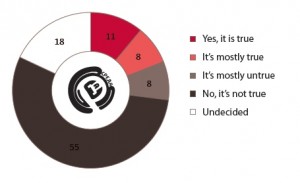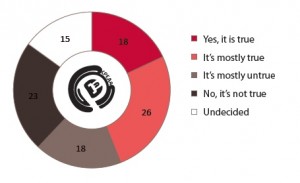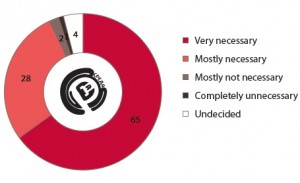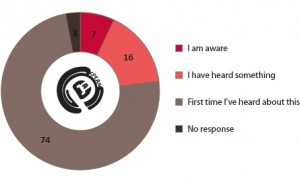The Russian demographic problems: Patriarch Cyril’s proposals
05/30/2011The results of the All-Russian representative survey conducted by the service SREDA (field work: Public Opinion Foundation “PENTA”, sample 1500 people)
According to official figures, Russians annually commit 1.6 – 1.7 million abortions. Despite this fact, during the nationwide survey, only 19% of the participants confessed that their child or several children weren’t born because of abortion. More than half of Russian citizens consider the measures taken by the state to increase fertility are ineffective. 93% of Russians say there is the need for cooperation between the state and the Russian Orthodox Church regarding family protection, motherhood, and childhood, but only 23% of respondents are aware of the fact that Patriarch Cyril sent the Russian Government his “proposals to improve the national policy of family care, motherhood and childhood.”
In the course of the study the respondents were asked to address the following statements & questions:
– Please choose if the following is true or false from your point of view: “My child(ren) was (were) not born due to abortion.”
– Please choose if the following is true or false from your point of view: “I think the measures that are taken by the state to increase the birth rate are effective.”
– Please rate the need for cooperation between the state and the Russian Orthodox Church regarding family care, motherhood and childhood.
– Are you aware, have you heard before, or are you hearing for the first time now that Patriarch Cyril has sent the Russian Government his “proposals to improve the national policy on family care, motherhood and childhood?”
For every thousand births, according to official data of the Ministry of Public Health, 1,022 abortions have been conducted (as reported by Interfax-Religion, with reference to a statement of Anton Belyakov, a member of the faction “Spravedlivaya Rossiya”). Each year 1.6 – 1.7 million abortions are carried out in Russia, and according to unofficial information, this number reaches 6 million.
Meanwhile, only 19% of Russians confessed to the statement that: “My child(ren) was (were) not born because of abortion.” 26% of women and 13% of men agreed (or mostly agreed) with this statement.
The percentage of positive answers regarding an aborted child or several children was proportionally higher among respondents over 55, non-working pensioners, Russians with one or two children in their family, superstitious citizens, church-going Christians and Christians belonging to the Russian Orthodox Church. In addition, more likely to agree with this statement were respondents who identified the government measures to increase fertility as effective, as well as those who are going to support Putin’s candidacy for the presidential elections in 2012.
The majority of those who confessed to an abortion were older than 32, citizens who consider themselves unhappy, and those who said they would like to have more children.
Those who agreeed less than on average with the statement “My child(ren) was (were) not born due to abortion” were Russians with higher education, students and pupils, and residents of villages and towns. Also, among those less likely to confess to having lost a child or children because of abortion were the respondents who consider themselves healthy and not superstitious.
The largest number of respondents who claimed not to have had an abortion was among those under 32 years.
When asked about the effectiveness of governmental policies aimed at increasing the birth rate, 44% of Russians agreed (or mostly agreed) with the statement that these measures are effective. More than on average, a positive affirmation of this statement was given by respondents whose main activity is the household (58%), citizens with a family of three or more children (60%), Muslims (58%) and residents of the Volga and Siberian federal districts. On the other hand, those people over the age of 65 were less likely to affirm the effectiveness of these government measures.
At the same time, 41% of respondents did not consider the measures taken by the state to ensure a growth in the birth rate to be effective. This answer was given somewhat more often than on average by respondents with higher education, entrepreneurs and wealthy citizens who can afford to buy a car.
Relatively more often than on average, those who do not believe in the effectiveness of these governmental measures live in Central, South and North Caucasus federal districts.
Evaluation of the effectiveness of state policies regarding birth rates varied among the different groups of Orthodox respondents. Orthodox respondents belonging to the ROC (Russian Orthodox Church), more often than the national average, said that the measures taken by the state are effective. However, Orthodox Christians who see themselves as not belonging to the ROC, in contrast, often talked about the ineffectiveness of government measures to increase fertility.
15% of respondents were undecided with regards to the effectiveness of these governmental measures. More often than on average, this ‘undecided’ response was given by students and pupils, the poor who do not have enough money for food and respondents with only primary school education.
93% of Russian citizens consider it necessary (or mostly necessary) that the state cooperates with the Russian Orthodox Church regarding family care, motherhood and childhood. This view was expressed more often on average by citizens who intend to attend the national elections and support “Edinaya Rossiya”.
Compared with the overall average, a positive view on the need for cooperation between the state and the Russian Orthodox Church was expressed less often in the Siberian Federal District, as well as by Russians who do not intend to go to the elections or have not yet decided on their electoral views.
Despite recognition of the need for cooperation between the state and the Russian Orthodox Church, the majority of citizens of the Russian Federation are not aware of the steps being taken by the Russian Orthodox Church in this regard.
Nevertheless, 23% of Russians know (or at least “have heard something”) about Patriarch Cyril sending to the Russian Government his “proposals to improve the national policy on family, motherhood and childhood”. Compared with the national average, this response was given more often by Russians over 65 years old. Also, more often than on average, awareness of these measures was found among respondents with three or more children, residents of large cities (with populations of 1 million or more) and respondents living in the North-West Federal District.
The least awareness of the Patriarch’s proposals in this regard was seen among the young people, childless respondents, and unemployed respondents, as well as inhabitants of villages and towns.
Orthodox Christians (particularly those involved or interested in participating in parish life) demonstrated the most awareness of the fact that Patriarch Cyril has sent the Russian Government his“proposals to improve the national policy on family care, motherhood and childhood”.
74% of respondents admitted that they heard about the Patriarch’s initiatives for the first time. More than on average, such a response was given by young people aged from 18 to 24 years (83%), workers (81%), and citizens with only primary school education (84%), as well as residents of the Far Eastern region (86%).





